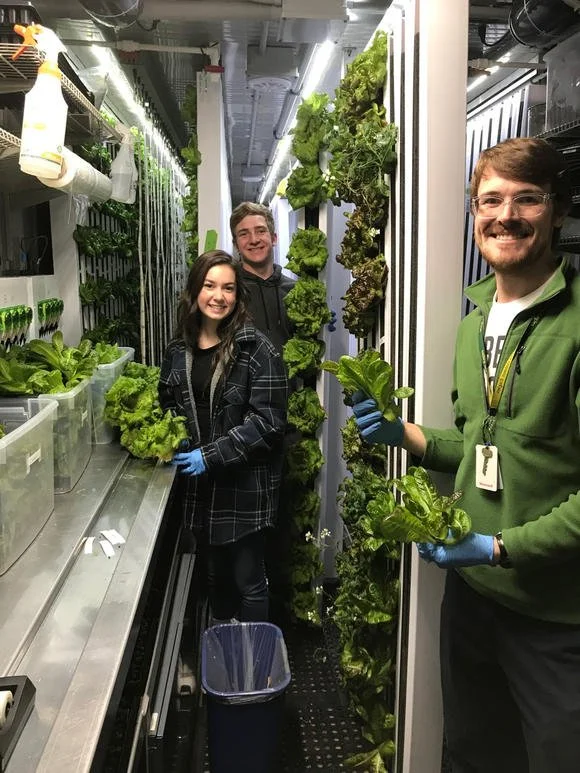USA; DENVER, COLORADO - DougCo’s Mountain Vista HS Pioneers Freight To Farm Program
May 31, 2022
Suzie Glassman/NewsBreak Denver
(Castle Rock, CO) Five years ago, Mountain Vista High School teacher David Larson applied for and won a grant from Mind Spark Learning and the Mortgage Family Foundation to purchase a repurposed shipping container turned vertical farm.
Larson, who's always preferred hands-on learning, had a hunch the Leafy Green Machine sold by Freight Farms would teach his students far more about the business of agriculture than any lecture.
Larson was right. The vertical farm, which requires no soil, teaches students everything from sustainable farming to buying, selling, and running a profitable business. "The traditional learning in the class is probably about 20%, so about 80% is doing," says Larson.
While the farm started as a resource for the agricultural business class, teachers from several disciplines, including biology and chemistry, now use the farm for hands-on learning.
Around 75 students are involved with the farm per year, says Larson, and many have gone on to study agriculture or plant science in college.
Mountain Vista students inside the farm | Photo provided by Mountain Vista High School
Feeding the community
Larson says the vertical farm produces 900 to 1,000 plants per week. The students sell about 50% through a farmer's market and give away the rest. They're so efficient with their resources that students meet their expenses two weeks into the month and then reinvest the other half or donate to programs and charities around the school.
Larson says the students have experimented with more than 100 different seeds to see what variations of lettuce and herbs grow fastest and taste the best.
For example, students love to grow green star lettuce, but they've found customers like butterhead lettuce the best. Larson says he sees a time in the future when students can survey customers more about their taste and cooking preferences as part of a business or marketing lesson.
The farm doesn't provide food for DCSD nutrition services or other programs around Denver, but Larson doesn't rule that out in the future. The farm is still young, and he sees many opportunities to grow as the program establishes roots in the community.
LED lights provide "sunshine" to the farm | Photo provided by Mountain Vista High School
Farming in a freight container
"The self-contained shipping container is the equivalent of two acres of farmland and uses only 10 gallons of water per day," beams Larson as he shows off how pumps recycle water through the farm.
Students learn to run Freight Farm's proprietary software, Farmhand, to monitor the water's Ph level, light exposure, and pump levels. They also use the software to know when to provide nutrients that typically come from the soil.
"Also, because the farm is enclosed in a shipping container and LED lights take the place of sunlight, students can run the lights at night when electricity is cheaper," explains Larson.
Considering Colorado's recent late snowstorm, perhaps the most significant benefit is that the farm can run year-round without the threat of a significant weather event wiping out its crop. Larson shuts down the farm every June to give the container a deep clean and allow himself a month's break.
About Freight Farms
Freight Farms, founded in 2011, set out to provide a solution for urban or rooftop farming but quickly found their farms could provide access to sustainable agriculture in remote environments with extreme climates, says Marc Bliss, customer success manager.
The farm comes in a standard refrigerated shipping container, which means it's insulated.
"We designed it this way for two reasons. First, we can keep the internal environmental conditions stable. And second, because our goal is to move farms, not food," says Bliss. “These farms go on the back of trucks and barges and are shipped all over the world.”
Freight Farms provides remote customer support through its software and helps connect farmers through a cloud-based server to solve problems and discuss best practices.
"Seventy percent of our customers are small businesses, farmers, and entrepreneurs, but the remaining 30% are schools and nonprofits," says Bliss.
The company's newest iteration of freight farm is called The Greenery, which provides two to four tons of produce annually. It only needs five gallons of water daily, equivalent to running a small dishwasher.
The container costs $149,000, and the software is $200 per month. Bliss says many schools apply for educational grants, like Larson with Mountain Vista High School, or through the USDA, which gives grants for local agriculture.
Lead Photo: Mountain Vista High School's Leafy Green MachinePhoto provided by Mountain Vista High School
# hydroponic farming# DCSD# Mountain Vista High School# Hands_on learning# business agriculture




